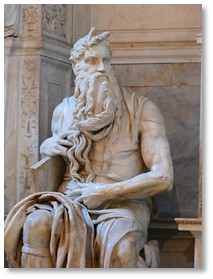 My daily Bible reading had me in Exodus 4-7 today where God is calling a reluctant Moses to go back to Egypt to lead the children of Israel out of slavery. This particular command from God to Moses jumped off the page at me:
My daily Bible reading had me in Exodus 4-7 today where God is calling a reluctant Moses to go back to Egypt to lead the children of Israel out of slavery. This particular command from God to Moses jumped off the page at me:
Exodus 4:22 Then you shall say to Pharaoh, ‘Thus says the Lord, “Israel is My son, My firstborn. So I said to you, ‘Let My son go that he may serve Me’; but you have refused to let him go. Behold, I will kill your son, your firstborn.”‘”
I have read this verse countless times over the years. What struck me today is how utterly and totally foreign a text like this sounds to fallen ears. After all, this is God pronouncing a judgment on Pharaoh, on his house, and on his dynasty—one that would take the life of Pharaoh’s own child. What kind of God does this?
The answer is that only a sovereign and holy God could rightly pronounce such a judgment upon sinners like this. And that is precisely the sort of God that the Exodus account reveals. It is a terrifying thing to fall into the hands of the living God, for our God is a consuming fire (Heb. 10:31; 12:29).
Who can accept this? No one, actually, apart from grace. For the natural man does not accept the things of the Spirit of God. Such thinks are foolishness to him, and he cannot understand them because they are spiritually appraised (1 Cor. 2:14). This is not a God who can be domesticated within the parameters of the fallen imagination. God is good all the time, even when taking the life of Pharaoh’s firstborn. If you cannot accept this, then you cannot accept God as He truly is.
Oh, how much we need our fallen minds conformed to the God of the Bible. Sadly, too many of us try to conform the God of the Bible to fallen minds. The result of such folly is that the mind remains fallen and inoculated from the God of the Bible.
Nineteen years ago this week, I heard a message that was epoch-making for me. As I read this passage from Exodus today, that old message came to mind again. I was at the Passion ’98 conference in Austin, Texas where John Piper preached “Did Christ Die for Us or For God?” In that message, Piper says this:
The ultimate rights of the universe are Creator rights and the ultimate goal of the universe is the goals of the Creator. What constitutes a problem in the universe is what doesn’t fit with his goal and what contradicts his rights — quite apart from your rights and your needs. That’s the clash of the universe. The difference between a God-exalting, God-centered, beginning-with-God mindset (which I call the biblical mindset) and man-centered mindset that says, “I have rights. I can even call God into question. I can put God Almighty in the dock and demand that He explain himself,” is another mindset and they don’t fit very easily.
What is the basic riddle of the universe, therefore? Is the basic riddle of the universe how to preserve man’s rights and solve his problems — say the problem of self-determination or the problem of suffering? Is that the basic riddle of the universe? Is the basic riddle of the universe how can an infinitely glorious, never-beginning, never-ending, holy, righteous God display in the creation he has made the full range of all his perfections including his grace and his wrath and justice? Which of those is the riddle of the universe? If you answer, “My problems are the riddle of the universe, my suffering is the riddle of the universe,” not how shall God be known in the fullness of his personhood and glory, then you will not comprehend the cross of Christ.
This message was epoch-making for me not only because it changed my life in 1998 but also because it helps me to read and understand and receive Exodus 4:22 in 2018.
I thank God for John Piper’s ministry in 1998 all the way to 2018. But most of all I thank God that He opened my heart and mind to receive the revelation of himself that he has daily set before me—it is something I never would have known if he had not given me eyes to see and ears to hear. What mercy. It is far above I could ever have asked for or imagined.
And even if our gospel is veiled, it is veiled to those who are perishing, in whose case the god of this world has blinded the minds of the unbelieving, that they might not see the light of the gospel of the glory of Christ, who is the image of God. For we do not preach ourselves but Christ Jesus as Lord, and ourselves as your bond-servants for Jesus’ sake. For God, who said, “Light shall shine out of darkness,” is the One who has shone in our hearts to give the light of the knowledge of the glory of God in the face of Christ. –2 Cor. 4:3-6
John Piper, “Did Christ Die for Us or For God?” (Passion 1998)



